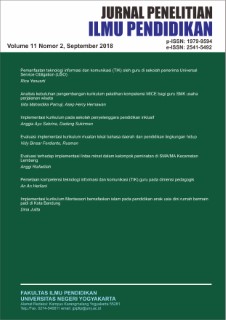Kepemimpinan Kepala Sekolah dalam Pengelolaan Ekstrakurikuler
DOI:
https://doi.org/10.21831/jpipfip.v14i1.32233Keywords:
kepemimpinan, pengelolaan, ekstrakurikulerAbstract
The Role of Principal's Leadership in Extracurricular Management
Leadership is the most important factor for the achievement of the goals of an organization, both educational organizations and non-educational organizations. This study aims to determine the role of the principal's leadership in extracurricular management. This research method used is a qualitative method with a description approach. The data collection techniques used were interviews and documentation. Types of data analysis using the Miles and Huberman model, namely data collection data reduction, data display, verification, and confirmation of conclusions. The research location in this study is located at MI Maarif Bego Yogyakarta. With the research subjects, namely the principal, vice-principal, two extracurricular trainers, and three students. The results of the study explained that in MI Maarif Bego the principal's leadership in extracurricular management was already very good. The principal has good competence in carrying out his duties. The extracurricular activities at MI Maarif Bego include Silat, tahfidz, scout, soccer, badminton, chess, swimming, and hadroh activities. The extracurricular activities that are required of students are Scouts, silat, and tahfidz. But in management it still has constraints such as the availability of teachers, facilities and season constraints.
References
Akpan, J. P., & Beard, L. A. (2016). Using constructivist teaching strategies to enhance academic outcomes of students with special needs. Universal Journal Of Educational Research, 4(2), 392–398.
Andriani, S., Suyitno, H., Junaidi, I., Suherman, S., Mujib, M., & Mardiyah, M. (2019). The application of differential equation of verhulst population model on estimation of Bandar Lampung population. Journal Of Physics: Conference Series, 1155, 012017.
Ashbourne, D., & Andres, L. (2015). Athletics, music, languages, and leadership: how parents influence the extracurricular activities of their children. Canadian Journal Of Education, 38(2), N2.
Ashdown, D. M., & Bernard, M. E. (2012). Can explicit instruction in social and emotional learning skills benefit the social-emotional development, well-being, and academic achievement of young children? Early Childhood Education Journal, 39(6), 397–405.
Balyer, A., & Gunduz, Y. (2012). Effects of structured extracurricular facilities on students' academic and social development. Procedia-Social And Behavioral Sciences, 46, 4803–4807.
Butt, R. (2016). Teacher assistant support and deployment in mainstream schools. International Journal Of Inclusive Education, 20(9), 995–1007.
Don, Y., Raman, A., Hussin, F., & Kasim, K. (2016). The role of teacher leadership and extracurricular activities in the construction of the soft skills of secondary school students in Malaysia. International Journal Of Academic Research And Development, 1(3), 89–95.
Elliott, E. M., Isaacs, M. L., & Chugani, C. D. (2010). Promoting self-efficacy in early career teachers: A principal's guide for differentiated mentoring and supervision. Florida Journal Of Educational Administration & Policy, 4(1), 131–146.
Fitrah, M. (2017). Peran kepala sekolah dalam meningkatkan mutu pendidikan. Jurnal Penjaminan Mutu, 3(1), 31–42.
Hartinah, S., Suherman, S., Syazali, M., Efendi, H., Junaidi, R., Jermsittiparsert, K., & Umam, R. (2019). Probing-prompting based on ethnomathematics learning model: The effect on mathematical communication skill. Journal For The Education Of Gifted Young Scientists, 7(4), 799–814.
Huda, S., Komarudin, K., Suherman, S., Syazali, M., & Umam, R. (2020). The effectiveness of al-Quran teaching model (atm) viewed from gender differences: The impact on mathematical problem-solving ability. Journal Of Physics: Conference Series, 1467, 012001.
Huda, S., Rinaldi, A., Suherman, S., Sugiharta, I., Astuti, D. W., Fatimah, O., & Prasetiyo, A. E. (2019). Understanding of mathematical concepts in the linear equation with two variables: impact of e-learning and blended learning using google classroom. Al-Jabar: Jurnal Pendidikan Matematika, 10(2), 261–270.
Ibrahim, M. S., Ghavifekr, S., Ling, S., Siraj, S., & Azeez, M. I. K. (2014). Can transformational leadership influence on teachers' commitment towards organization, teaching profession, and students learning? a quantitative analysis. Asia Pacific Education Review, 15(2), 177–190.
Kasidah, M. A. (2017). Kepemimpinan kepala sekolah dalam meningkatkan kinerja guru pada sekolah dasar luar biasa negeri Banda Aceh. Jurnal Administrasi Pendidikan: Program Pascasarjana Unsyiah, 5(2).
Kodiran, K. (2017). Kepala sekolah sebagai tugas tambahan. Al-Idarah: Jurnal Kependidikan Islam, 7(1), 146–158.
Makmur, J. (2012). Tips menjadi kepala sekolah yang profesional. Jogjakarta: Diva Press.
Mette, I. M., Range, B. G., Anderson, J., Hvidston, D. J., & Nieuwenhuizen, L. (2015). Teachers' perceptions of teacher supervision and evaluation: a reflection of school improvement practices in the age of reform. Education Leadership Review, 16(1), 16–30.
Rany, W., Suherman, S., Anggoro, B. S., Negara, H. S., Yuliani, M. D., & Utami, T. N. (2020). Understanding mathematical concept: The effect of savi learning model with probing-prompting techniques viewed from self-concept. Journal Of Physics: Conference Series, 1467, 012060.
Sugiyono. (2008). Metode penelitian pendidikan: Pendekatan kuantitatif, kualitatif dan r & d. Bandung: Alfabeta.
Suherman, S., Prananda, M. R., Proboningrum, D. I., Pratama, E. R., Laksono, P., & Amiruddin, A. (2020). Improving higher order thinking skills (hots) with project based learning (pjbl) model assisted by geogebra. Journal Of Physics: Conference Series, 1467, 012027.
Umar, H. (2001). Proses belajar mengajar. Jakarta: Bumi Aksara.
Yunianto, T., Negara, H. S., & Suherman, S. (2019). Flip builder: Pengembangannya pada media pembelajaran matematika. Terampil: Jurnal Pendidikan Dan Pembelajaran Dasar, 6(2), 115–127.
Yunianto, T., Suyadi, S., & Suherman, S. (2020). Pembelajaran abad 21: Pengaruhnya terhadap pembentukan karakter akhlak melalui pembelajaran stad dan pbl dalam kurikulum 2013. Premiere Educandum: Jurnal Pendidikan Dasar Dan Pembelajaran, 10(2), 203–214.
Downloads
Published
How to Cite
Issue
Section
Citation Check
License









